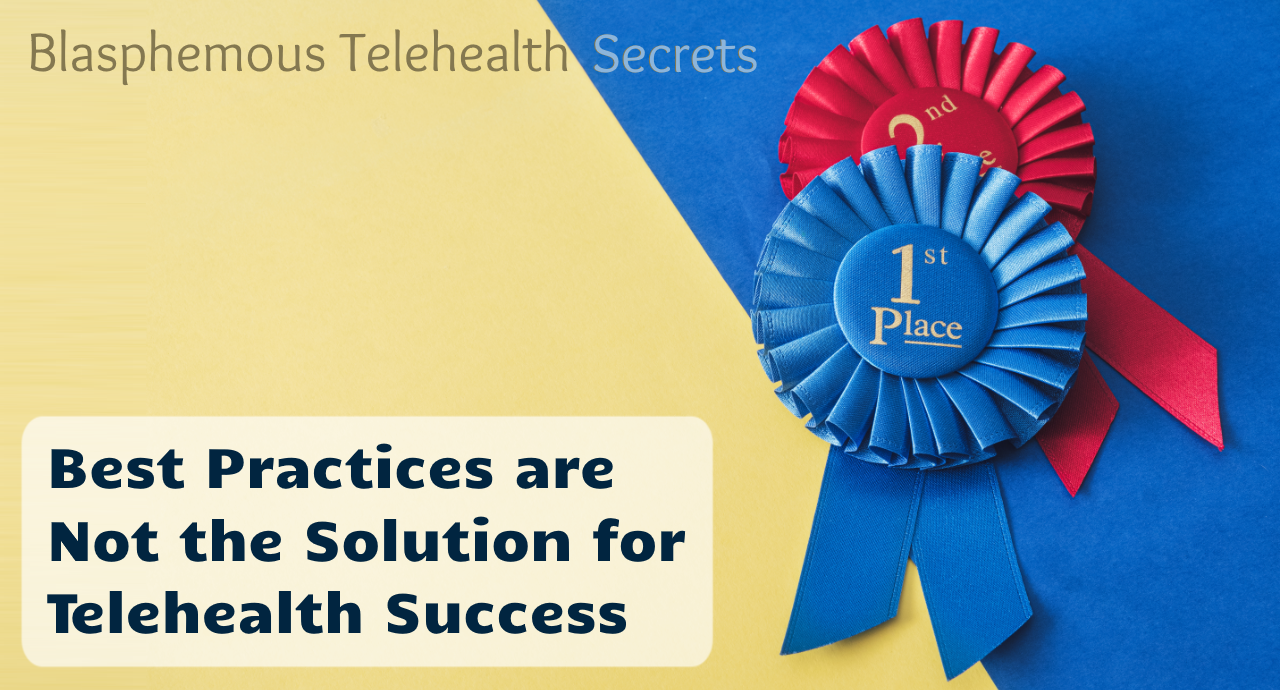All Great Truths begin as Blasphemies.
~George Bernard Shaw
Blasphemous Telehealth Secrets, Part 2
I get it. In these busy, stressful, rapidly-changing times, people are constantly looking for quick fixes, proven solutions, even silver bullets. Especially in healthcare the desire to “just share with me a best practice” or the quest for “let me see what others are doing” is appealing.
Unfortunately the reality is that copying someone else’s telehealth best practices is not the solution for achieving telehealth success. Sure, they may give you some inspiration as to what your organization should be developing. But telehealth is too complex to achieve operational, financial, and clinical success by applying someone else’s solution.
Can I copy your homework?
In a sense asking for someone else’s best practice is just like asking a fellow student or school mate to copy their homework. Assuming you are not caught, that may work for simple assignments with a few numbers or formulas. But for more complex assignments such as research papers or essays, copying someone else’s work will get you caught immediately.
Besides even for the less complex homework assignments, as we know as adults, the main downside is that the copy-cat is cheating themselves out of the learning process and the resultant retention of knowledge, because copying someone else’s work is not the same as grappling with the challenges yourself.
The same applies to the quest to lay your hands on best practices: It’s an admission that either you do not know where to start or that you have not been given sufficient time (and, often, knowledge to know where to start).
Do someone else’s glasses work for you?
Stephen Covey in his landmark classic “The 7 Habits of Highly Effective People” describes the illustrative story of an optometrist handing the patient his own glasses that had served him well for many years, only to then complain about the lack of gratitude by the patient upon stating that those glasses don’t work for them.
That point is that what works for you will most likely not work for others, especially not in an area as complex as telehealth.
Stuck in Mediocrity
There is another reason why using others’ Best Practices does not lead to telehealth success: Because the adoption of a best practice is static. It’s often “set and forget”. A best practice is discovered, mildly adapted to your own environment, implemented and then forgotten about. “Hey, it worked for this other clinic, so I’m sure it’ll work for us.”
What’s actually missing is not only the periodic assessment and measuring of how well the implementation of that best practice worked, but also a continuous adjustment and optimization for high performance.
Optimization: The Magic Pill for Telehealth Success



Let’s use the example of telehealth workflows as an example. As I’ve shared before there are at least eight workflows that need to be developed – from tele-scheduling and tele-rooming to tele-discharge and tele-follow up.
The temptation is high to reach out to your network (or to me) to ask for best practices: “What is your process for scheduling telehealth visits?”
The problem with this approach is that virtually all telehealth-related workflows are highly unique to the nature of your practice, your payor mix, the digital literacy of your patient population, your clinician buy-in to telehealth, your leadership engagement, etc.,
You are much better off by spending the time to develop your own process, getting it out there (maybe starting with a few clinicians) and then relentlessly optimizing the process for optimal performance – whether that it is the time and effort it takes, the mistakes that are being made or the satisfaction of staff, patients, and clinicians.
The tried and true approach of define, measure, analyze, improve and control will not only get you to a much higher performance, you will indirectly also build a much stronger buy-in and support by all involved in the design of your solution than if you had simply adopted a best practice someone sent you.
If you don’t know where to start
If the drive to find a best practice is that your team does not have a good understanding of where to start and also recognizes that it does not have the knowledge, then the alternative solution is quite simple, though not quite as obvious (and not often practiced): hire an expert.
Mind you, this is not intended as a blatant sales pitch. But if in healthcare we constantly refer to specialists and practitioners are extremely diligent about staying in their lane of expertise (and, grantedly, within the scope of their license), then why does the administrative side of healthcare not follow that same, proven logic? Why is it that so many healthcare organizations insist on figuring out things on their own – maybe attending a few webinars and then wiggling their way through coming up with a solution – that may or may not be the best they can do, because they simply don’t know what they don’t know.
There are numerous experts out there, consultants such as our team of experts at Ingenium, that have years, if not decades of experience designing and implementing telehealth solutions.
I propose that rather than looking for a best practice to copy, maybe your organization’s best practice can be to let telehealth experts do their work so you can focus on running and supporting your practice. It’s an investment that will pay good dividends quickly, because experts have a much higher probability of doing it right the first time, whereas non-experts may have to do things over a number of times.








To receive articles like these in your Inbox every week, you can subscribe to Christian’s Telehealth Tuesday Newsletter.
Christian Milaster and his team optimize Telehealth Services for health systems and physician practices. Christian is the Founder and President of Ingenium Digital Health Advisors where he and his expert consortium partner with healthcare leaders to enable the delivery of extraordinary care.
Contact Christian by phone or text at 657-464-3648, via email, or video chat.









Leave A Comment